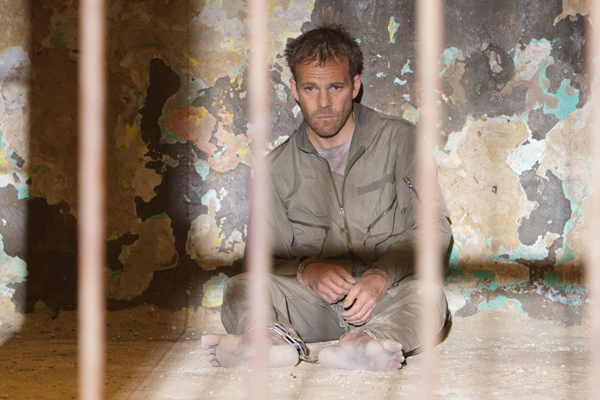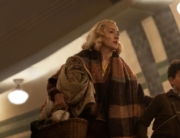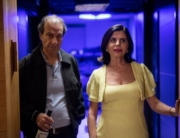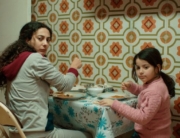Israel’s 1982 war in Lebanon has haunted Israeli films in recent years, through soldiers who served then who relive their guilt over the invasion amidst the chaos of civil war in Ari Folman’s Waltz with Bashir (2008) and Samuel Maoz’s Lebanon (2010). Giving the conflict a much more humanistic face, Zaytoun opens just a month before the full attack, with visually operatic street scenes of busy domestic lives carrying on amidst the tensions between Beirut’s civilians vs. Palestinian refugees, Shiite Muslims vs. Christian Phalangist militia checkpoints, the PLO vs. various factions in the camps, and the United Nations’ ineffectual peacekeepers separating them all.
Running like a loose thread through this vivid tapestry is enterprising 12-year-old Fahed (Abdallah El Akal), playing hooky to help support his Palestinian refugee family by selling gum and cigarettes. He skirts the ire of competing Lebanese vendors as well as a kindly UN medic (Alice Taglioni), who shoos him to go back and learn English at his bullet-scarred, sandbagged school (where empty desks are memorials to student “martyrs” killed from stray bombs and bullets). PLO recruiters are more militant truant officers, grabbing boys for hours of soldierly training to “redeem Palestine.”
Fahed’s home is full of pastoral dreams of returning to Palestine. His father ritually cares for a potted olive tree (zaytoun is Arabic for olive), even spitting on it when there’s little water available, and his grandfather recites memories of the house and orchard they had to leave in 1949. When his father is killed in a bombing, Fahed tries hard to carry on these family traditions.
A raiding Israeli jet crashes and the enemy pilot is dragged into this tinderbox as a potentially valuable informant and pawn. His hood comes off for interrogation and torture, and he’s revealed to be played by Stephen Dorff, very much physically embodying the mythologized look of the Entebbe hero Yonatan Netanyahu (speaking English with a very credible-sounding Israeli accent). As factions argue about what to do with the Israeli, the children put their shooting training to use as guards. Even after Fahed wounds the pilot, they reluctantly bond through cigarettes, soccer, and their facility with English. After the boy sneaks a look at a photo of the Israeli’s pregnant wife, Fahed cannily decides on a kind of separate peace to get both him and the injured pilot home.
The film turns into a road movie through several means of hired and stolen transport, by derring-do and humorous subterfuges—from city alleys through the ruins of ancient stone roads that emphasizes the short geographical and long societal distance between their two worlds (filmed entirely within Israel). By the time the pilot feels close enough to the boy to reveal his name, Yoni, he feels committed to help him salvage the olive tree. Together they schlep from the refugee camp on an odyssey to find Fahed’s ancestral home.
Zaytoun brings up themes seen in earlier movies—a young Palestinian hanging on to a fabled key as symbol of a grandfather’s right of return, which was also central in Annemarie Jacir’s Salt of This Sea (2010). Fruit orchards were in contention in director Eran Riklis’s earlier Lemon Tree (2008), and a Muslim child’s touching relationship with a captured soldier figures significantly in TV’s Homeland, based on the Israeli series Prisoners of War. Young Abdallah El Akal also played an urchin sympathetically crossing the Palestinian/Israeli divide in Kikuo Kawasaki’s (2011). Because of debut screenwriter Nader Rizq’s panoply of varied, if superficial, characters; Dorff’s brusque to tenderly paternal performance, surrounded by a talented ensemble of Palestinian and Israeli-Arab actors, this border crossing (before tension gets really ugly) is worth traveling.







Leave A Comment